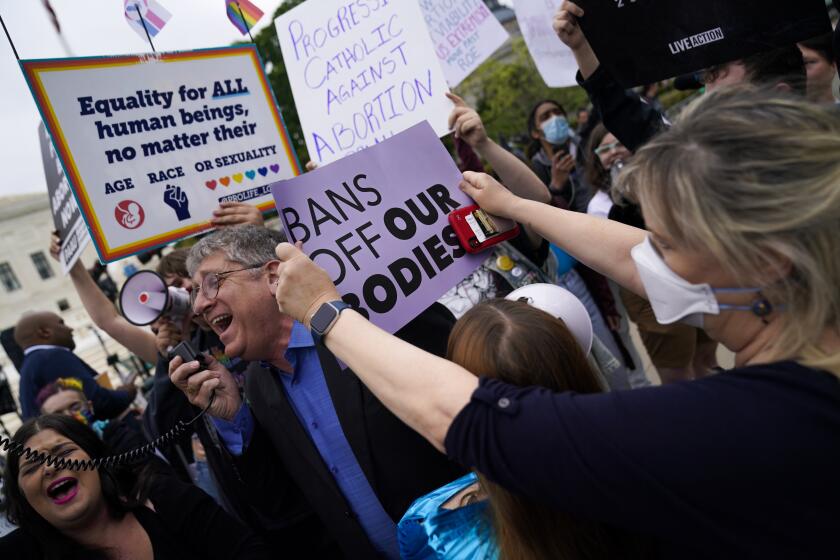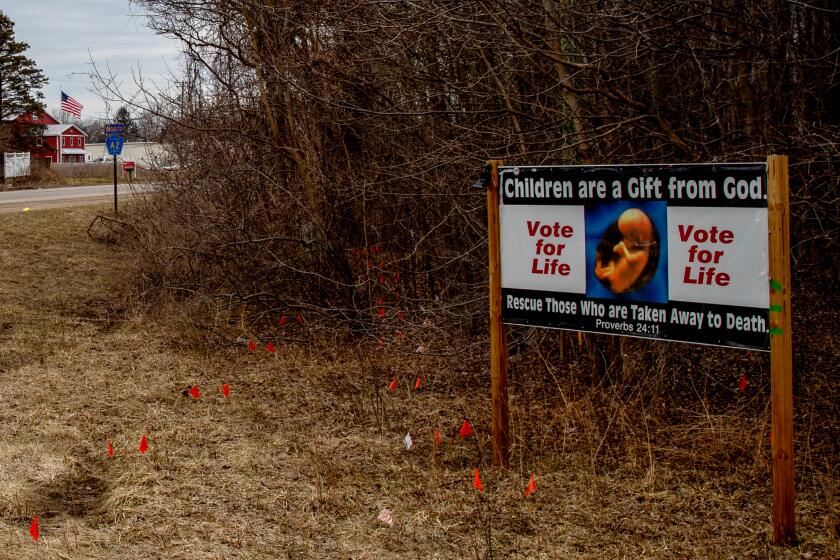If Roe vs. Wade is overturned, what happens?

- Share via
A draft opinion leaked to Politico this week suggests the U.S. Supreme Court could soon overturn Roe vs. Wade, the landmark 1973 case that legalized abortion nationwide. Here is where things stand:
What is the Supreme Court ruling on?
The case now before the court — Dobbs vs. Jackson Women’s Health Organization — is an appeal from Mississippi to ban abortions after the 15th week of pregnancy. The state is not asking the court to overrule Roe vs. Wade or later cases that reaffirmed it.
But many abortion rights supporters have been worried the court’s conservative majority could do just that. The leaked draft was written by conservative Justice Samuel A. Alito Jr. Nothing is final until the court votes and issues its ruling.
As news spread of a leaked draft opinion that indicated justices are prepared to overturn Roe vs. Wade, demonstrators headed to the Supreme Court.
If it upholds Mississippi’s law, it would be its first ratification of an abortion ban before the point when a fetus can survive outside the womb — the standard set in Roe vs. Wade. The immediate effect would be limited, because most abortions take place in the first 13 weeks of pregnancy, according to the U.S. Centers for Disease Control and Prevention.
But such a ruling could leave the decision to state lawmakers, laying the groundwork for even more state restrictions on abortion.
Haven’t states already restricted abortion?
No state has completely banned abortion, though some have come close.
Texas enacted a law last fall that makes abortion illegal after the detection of cardiac activity — the strictest abortion legislation in more than 50 years. It was also the first abortion restriction not to rely on state penalties for enforcement but rather on civil lawsuits, authorizing any member of the public to sue anyone who performs or facilitates an illegal abortion for at least $10,000 per abortion, plus court costs. The laws make no exception for rape or incest.
On Tuesday, Gov. Kevin Stitt, a Republican, signed a similar law that the Oklahoma Legislature approved last month. The law takes effect immediately, although abortion rights advocates have already challenged it in court.
“I want Oklahoma to be the most pro-life state in the country,” Stitt tweeted after signing the bill.
The governor recently signed a separate and stricter law that outlaws abortion except to save the life of a pregnant woman and makes the procedure a felony punishable by up to 10 years in prison and a $100,000 fine. That law is set to take effect in late August. Experts say it is unlikely to survive a court challenge unless Roe vs. Wade is struck down.
If the Supreme Court overturns Roe vs. Wade, how many more states could ban abortion?
The Guttmacher Institute, an abortion rights advocacy group, predicts that bans would be imposed in at least 26 states, including 13 that have “trigger laws” set to take effect immediately should the constitutional right to abortion be abolished.
Those bans would eliminate access to abortion for large swaths of the Deep South, Midwest and West — including Arizona, Idaho and Utah — creating areas that abortion rights advocates refer to as “abortion deserts.”
Would the Supreme Court ruling affect the availability of abortion medication?
It could. States have increasingly restricted the availability of abortion medication, which accounts for more than half of all U.S. abortions.
At least 32 states require it be administered by a physician and 19 mandate that the clinician providing medication abortion to be physically present, in effect prohibiting telemedicine. Indiana and Texas prohibit its use after a specific point in pregnancy. The Texas law, passed last year, also does not allow for the drugs to be shipped by mail, though it is unclear how that can be enforced.
The Republican Party, evangelical Christianity and the antiabortion movement have long been inextricably linked. Some Christians want to change that.
If states ban abortion, can’t people just travel to clinics in California or other states?
Not all women can travel out of state. Many have to work or have children (60% of women seeking abortions already have kids, according to the CDC). Migrant women in the country illegally must clear inland checkpoints run by U.S. Customs and Border Protection.
For those who can go out of state, experts predict that the fall of Roe vs. Wade would increase the distance they have to travel, the overall cost of their abortions and the workload for clinics.
Clinics in states bordering Texas have been overwhelmed in recent months by out-of-state patients seeking abortions, and the crush is likely to get worse as the latest Oklahoma law takes effect. Given scheduling delays and added travel, providers expect to see patients arriving later in their pregnancies, which could further limit which clinics can treat them.
Many so-called haven states, including California, limit abortions in the later stages of pregnancy. Those are extremely rare, but if the lack of access to abortions at home translates to big delays, more women would have to turn to the six states, along with Washington, D.C., that impose no gestational limits. Clinics in at least two of those states — Colorado and New Mexico — have already seen an uptick in patients due to abortion restrictions in Texas.
More to Read
Sign up for Essential California
The most important California stories and recommendations in your inbox every morning.
You may occasionally receive promotional content from the Los Angeles Times.













